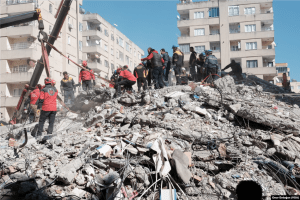
High inflation can cause great inconvenience, but there are certainly worse things, in particular, natural disasters. Last week southeastern Turkey and northern Syria were hit by a 7.8 magnitude earthquake, which caused large numbers of casualties and severe infrastructure damage.
Budget expenditures for Turkey’s reconstruction could amount to 5.5% of gross domestic product over two years, according to Bloomberg estimates. Fitch Ratings analysts gave a slightly more optimistic forecast – US$4 billion in insurable losses and around $1 billion in insured losses, due to low insurance coverage in the affected regions.
The outlook could get even grimmer if one of the dams damaged by the earthquake collapses and a flood spreads over the region. For the time being, the government has allocated an initial 100 billion lira ($5.3 billion) for reconstruction. Affected families will receive 10,000 lira ($530).
It is worth noting that after the devastating earthquakes in 1999, the Turkish Catastrophe Insurance Fund (TCIP) was established, which included 32 insurance companies. In addition, there is compulsory earthquake insurance to compensate for property damage.
Even though the catastrophe insurance pool has a claims-paying capacity of around $2.5 billion, households will not receive full indemnification, first, because not all residential properties were insured, and second, because TCIP doesn’t cover human losses, liability claims, or indirect losses, such as business interruption.
As for Syria, the situation is even worse given the country’s ongoing civil war. According to the European Council on Foreign Relations, “while emergency aid to Turkey is flowing relatively unhindered, political dilemmas are significantly hampering its passage into Syria.”
As for market reaction, insurance stocks suffered a sharp fall. For the past week, Türkiye Sigorta Anonim Sirketi lost more than 12%, Aksigorta AS went down by 15%. German reinsurance group Hannover Rück SE went down by a mere 3.2%.
Overall, investors sold around $35 billion of equities, forcing Turkey’s stock exchange to suspend trading for the first time in 24 years. Of course, there also were beneficiaries. Shares of cement companies Konya Sirketi and OYAK Çimento Fabrikalari AS, for example, went up by 26% and 16% correspondingly.
What is next?
Tectonic plates are constantly on the move, so there will be no shortage of earthquakes. The bad news is that scientists believe it is almost impossible to predict earthquakes. The same is true for other natural disasters, including forest fires, floods and tsunamis.

